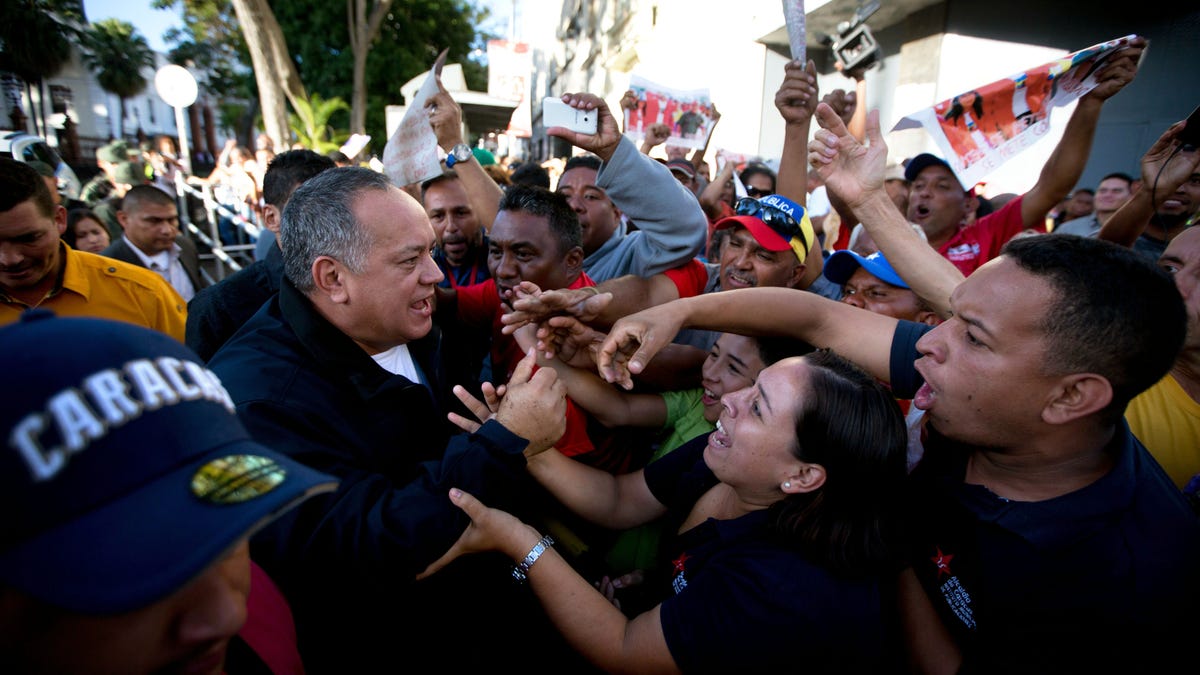
Diosdado Cabello greets government supporters as he leaves the legislature in Caracas, Jan. 6, 2016. (ap)
Caracas – Venezuela’s new majority in the National Assembly has a long list of problems, the most pressing being the increasingly long food lines and record-breaking inflation.
And yet, political analysts say, the newly sworn-in opposition is keeping itself busy in a power struggle with the 54 socialist party lawmakers from the ruling party that still remain after last month’s congressional election.
One of the first orders of business for the members of the opposition after the Jan. 5 installation was to remove the numerous portraits of late President Hugo Chavez hanging on the National Assembly’s walls. This, followed by the decision to swear in three opposition lawmakers despite a Supreme Court mandate not to do so, infuriated the already sore Chavistas in the chamber.
In response to this, Chavistas appealed to the Supreme Court once again and on Monday night the high court ruled that any bill coming out of the current Assembly is null until the three legislators are removed.
“They ignored the Court, which is investigating an official challenge to the Dec. 6 elections in Amazonas [south of the country],” Elias Jaua, a former vice president and one of the 54 representatives the ruling party now has in the National Assembly, told Fox News Latino.
“They are doing it to create the conditions for a coup and overthrow the revolution,” he added.
While the opposition, headed by the notoriously hard-liner Henry Ramos, has openly said their goal is to replace President Nicolas Maduro in the next six months, the government’s strategy aims at reducing the new Assembly’s power at all costs — even creating a parallel congress called the “Community Assembly."
Nicmer Evans, a political analyst and former advisor of prominent government figures, said this situation is “dramatic” for Venezuelan citizens.
“Both [sides] are trying to polarize the country in an effort to get the best out of the social unrest and hurt its rival,” said Evans. “But none of the current political leaders are working to solve the crisis,” added Evans, who broke with the government after Maduro took power in 2013, following Chavez’s death.
Evans and others note that the hostilities, which have intensified in the last week, are in fact limiting the possibility of any meaningful dialogue.
And it goes without saying that decades-old protocol is also paying a price.
According to the Constitution, after the installation of a new National Assembly a delegation of the legislative body pays a visit to the heads of the executive and judicial branch — a meeting that FNL has learned will not happen anytime soon.
“The political leaders are playing a risky game because they are not thinking about the people’s wellbeing. They are fighting for power when the main concern of Venezuelans is solving the economic crisis,” Evans said.
But the bickering and finger-pointing goes on, and some say conciliation is all but impossible.
“They represent the oligarchic and imperialists interests, while we represent the will of the people and the country,” said Oscar Figueras, one of the government’s representatives. “Our mission now is to recover the popular support to beat their attempts to overthrow the government.”
Meanwhile, the latest Barclays report issued on Friday warns “that the likelihood that Venezuela can avoid default is diminishing” because of the decline of oil prices and the absence of structural changes.
“The deepening of the economic crisis is likely to increase social and political tensions,” it read. “The radicalization of the government may be pushing Venezuela toward a confrontation of powers in which there is neither an independent referee nor a mediator.”
In the face of this, the moderate faction in the opposition is urging to avoid extreme political fights.
“Those who want change cannot forget that it’s about uniting Venezuelans and spending the time trying to resolve the problems we are all facing,” Miranda Governor Henrique Capriles, from Primero Justicia, wrote on Twitter.
“We have an acute shortage of medicines and people are worried because they don’t have enough money to eat,” said for his part William Barrientos, from Un Nuevo Tiempo. “We must solve these problems.”
